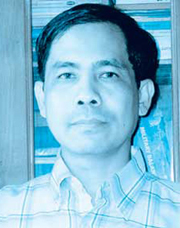Last week, one of Burmese President Thein Sein's political advisers, Ko Ko Hlaing, told Radio Sweden that Burma has only around 600 political prisoners—a figure much smaller than the more widely accepted estimate of around 2,000 (of whom some 220 were freed last week). The Irrawaddy contacted Ko Ko Hlaing to ask him about this disparity, and for his response to critics who say that the relatively small number of political prisoners released suggests that recent moves toward reform are losing steam.
 |
| One of Burmese President Thein Sein's political advisers, Ko Ko Hlaing |
Question:
In your interview with Radio Sweden last week, you said that there are only 600 political prisoners in Burma. Can you explain how you arrived at that figure?Answer: I don't have exact figures for the number of prisoners of conscience. If you want that, you can contact the Ministry of Home Affairs (MOHF), which is responsible for compiling a list.
Q: The United Nations and other organizations watching the human rights situation in Burma say there are around 2,000 political prisoners in the country. Why do you think their numbers and yours are so different?
A: It may be because organizations operating outside the country have little opportunity to collect the exact figures. I don't think they can compile an exact list. They may, for example, include some people on the list who they assume are in prison. It is also possible that they don't know about those who have already been released. The MOHF's list may be more exact, as people in the ministry have compiled it based on verifiable statistics. I think the differences may also depend on how people define prisoners of conscience and ordinary prisoners.
Q: We have heard that more prisoners may be released soon. Can you comment on that?
A: I don't know for sure, but authorities responsible for prisoners have said they will release more. We are advisers, so it is quite difficult for us to provide detailed information.
Q: The suspension of work on the Myitsone dam project was seen as a positive move by people within and outside the country, but many were disappointed by the small number of political prisoners who were released last week. Some are now saying that reforms seem to be stalling. As an adviser to the president, what are your views on this?
A: Many people want many changes to come quickly. I think the recent prisoner release was not the last. According to the Constitution, it is within the president's authority to grant amnesties, so more may come. I think it is premature to say that the pace of reforms has slowed. There are many other things we need to do. We can't just sit still and do nothing. So I think that whether reforms are slowing down or not is mostly a matter of perception.
Q: Another issue is armed conflict in ethnic areas. The government has come up with plans to stop the ongoing war in those areas, but ethnic groups say they want a nationwide ceasefire and an inclusive political dialogue, not just one-on-one talks with the government. What are your views on this?
A: There are demands from both sides in a dialogue. It's like bargaining—the seller has his price, and the buyer has his. But if both parties just stick to their demands and refuse to do anything unless their demands are met, an agreement cannot be reached.
What is happening is between brothers and between ethnic nationalities. I haven't heard any group saying that it will secede from this country if the government doesn't comply with its demands. Arguing is just a normal part of the process. I think they can come to an agreement if they negotiate.


